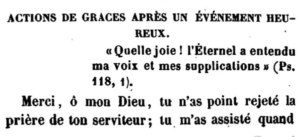Contributor(s): Shared on: Categories: Tags: | Source (French) | Translation (English) |
|---|
Actions de graces après un événement heu-reux.
|
Thanksgiving after a joyful reprieve. |
«Quelle joie! l’Éternel a entendu ma voix et mes supplications» (Ps. 118, 1).
|
“YHVH has heard my voice and my supplications” (Psalms 118:1). |
Merci, ô mon Dieu, tu n’as point rejeté la prière de ton serviteur; tu m’as assisté quand je t’ai invoqué; j’ai ’été sauvé par ta divine protection. A ta voix les dangers qui m’environnaient se sont évanouis.
|
Thank you, O my God, you did not reject the prayer of your servant; you helped me when I invoked you; I was saved by your divine protection. At your voice the dangers that surrounded me vanished. |
Agrée, Seigneur, l’expression de ma reconnaissance et les vœux que je fais de te consacrer mon cœur, et d’employer ma vie entière à me rendre digne de tes bienfaits.
|
Lord, please accept the expression of my gratitude and the vows I make to consecrate my heart to you, and to use my whole life to make myself worthy of your blessings. |
Éternel mon Dieu, je veux me pénétrer de ton amour; je veux être bon et secourable à tous mes frères, afin que cette existence que tu m’as renouvelée par ta grâce, soit utile à tous les hommes mes semblables.
|
O YHVH my God, I want to be filled with your love; I want to be good and helpful to all my brethren, so that this life that you have renewed me by your grace may be useful to all my fellow men. |
Que ta bonté, mon Dieu, soit toujours présente à ma pensée; que le souvenir de ton secours fortifie ma foi, et soutienne mon courage dans les épreuves auxquelles il te plaira peut-être de me soumettre encore.
|
May your goodness, my God, be always present in my thoughts; may the memory of your help strengthen my faith, and sustain my courage in the trials to which it may please you to subject me again. |
C’est en toi seul, Seigneur, que je me confie, à toi seul mes actions de grâces, car tu as été et tu seras toujours ma force et mon salut! Amen.
|
It is in you alone, Lord, that I entrust to you alone my thanksgiving, for you have been and will always be my strength and my salvation! Amen. |
Source(s)
 Jonas Ennery (Jan. 2, 1801, Nancy - May 19, 1863, Brussels) was a French deputy. He was for twenty-six years attached to the Jewish school of Strasbourg, of which he became the head. In collaboration with Hirth, he compiled a Dictionnaire Général de Géographie Universelle (4 vols., Strasburg, 1839–41), for which Cuvier wrote a preface. Soon afterward he published Le Sentier d'Israël, ou Bible des Jeunes Israélites (Paris, Metz, and Strasburg, 1843). At the request of the Société des Bons Livres he took part in the editorship of Prières d'un Cœur Israélite, which appeared in 1848. In 1849, despite anti-Jewish rioting in Alsace, Ennery was elected representative for the department of the Lower Rhine, and sat among the members of the "Mountain." He devoted his attention principally to scholastic questions. After the coup d'état he held to his socialist republican views and resisted the new order of things. For this, in 1852 he was exiled from France for life. He retired to Brussels, where he lived as a teacher until his death. Ennery's brother, Marchand Ennery, was the chief rabbi of Paris.  Arnaud Aron (March 11, 1807, in Sulz unterm Walde, Alsace – April 3, 1890), the Grand Rabbi of Strasbourg, began his Talmudic studies at an early age at Hagenau and continued them at Frankfort-on-the-Main. In 1830 he became rabbi of the small community of Hegenheim in Upper Alsace; and of Strasbourg in 1833. As he was under thirty, the age prescribed by law, he required a special dispensation to qualify for the office. In Strasbourg, Aron acquired the reputation of an eloquent and inspiring preacher and a zealous communal worker. He assisted in founding the School of Arts and Trades and took active interest in other useful institutions. In 1855 he convened an assembly of the rabbis of the department of the Lower Rhine for the consideration of religious questions. Aron was the author of the catechism used for confirmation as prescribed by the Consistory of Lower Alsace. In 1866 the French government acknowledged his services by appointing him a Knight of the Legion of Honor. In 1870, while Strasbourg was besieged, it was he, together with the archbishop, who raised the white flag on the cathedral. Subsequently he was decorated by the German emperor. Aharon Varady (M.A.J.Ed./JTSA Davidson) is a volunteer translator for the Open Siddur Project. If you find any mistakes in his translations, please let him know. Shgiyot mi yavin; Ministarot Naqeni שְׁגִיאוֹת מִי־יָבִין; מִנִּסְתָּרוֹת נַקֵּנִי "Who can know all one's flaws? From hidden errors, correct me" (Psalms 19:13). If you'd like to directly support his work, please consider donating via his Patreon account. (Varady also transcribes prayers and contributes his own original work besides serving as the primary shammes for the Open Siddur Project and its website, opensiddur.org.) Read a comment / Leave a comment (moderated) Works of related interest: |












Leave a Reply